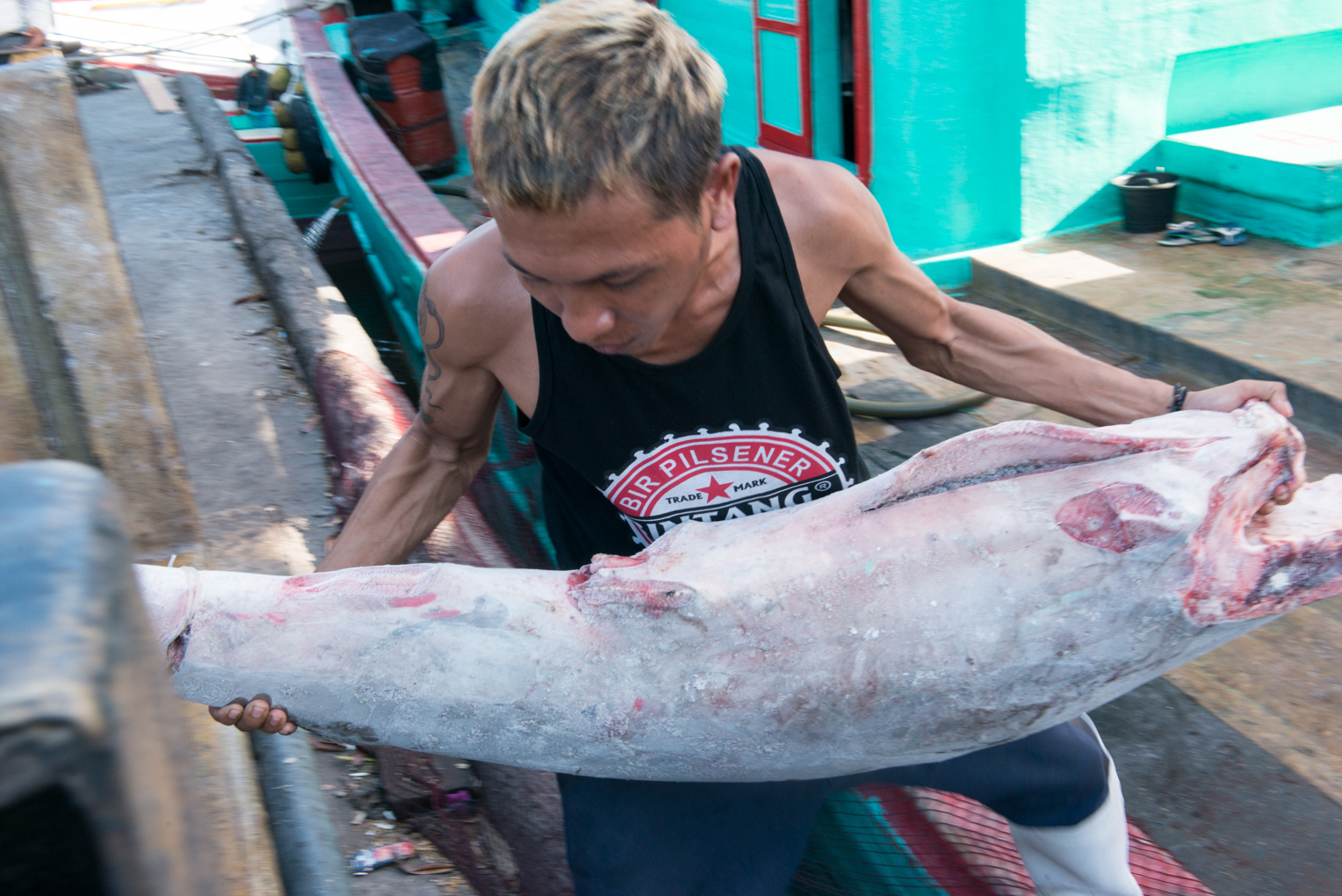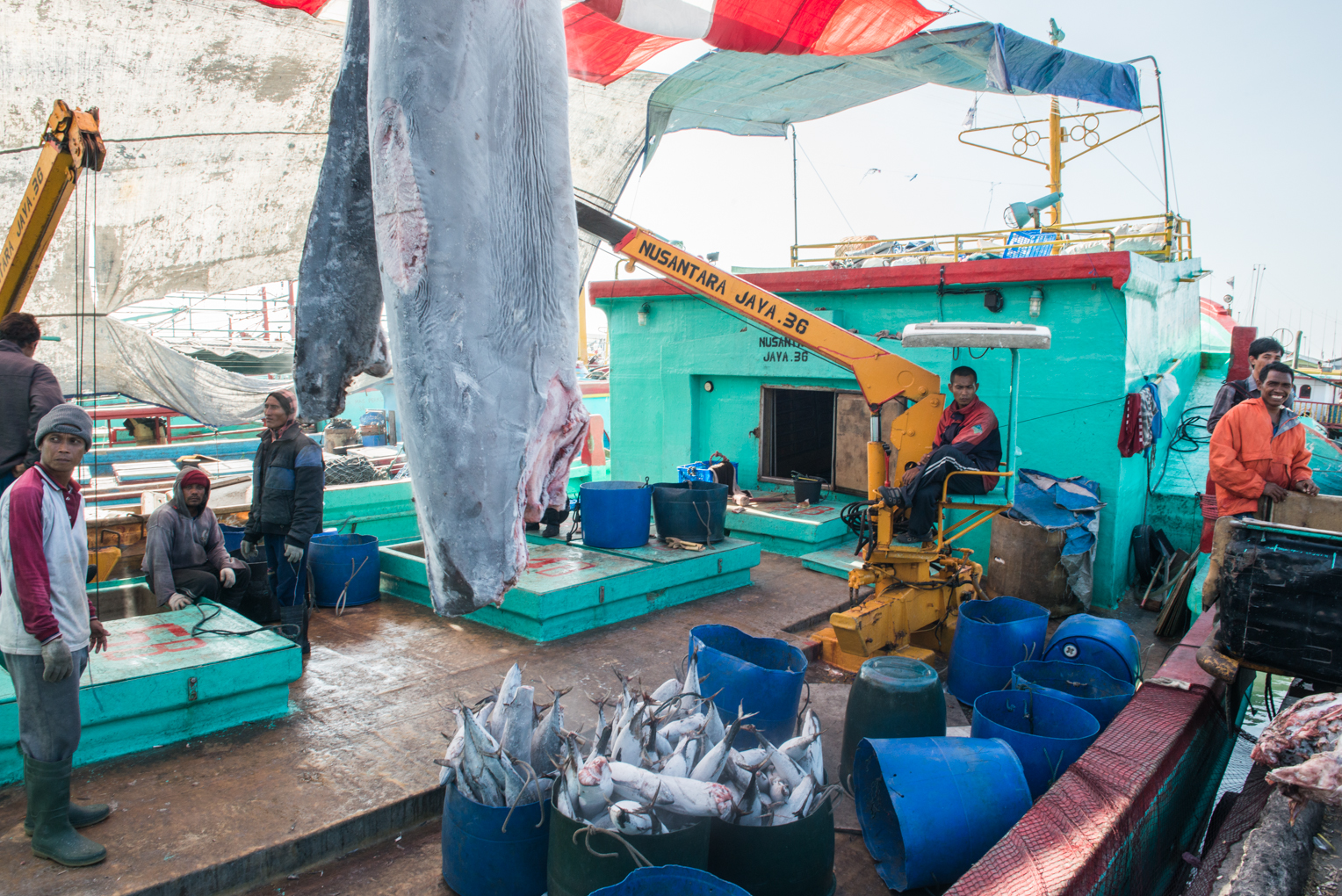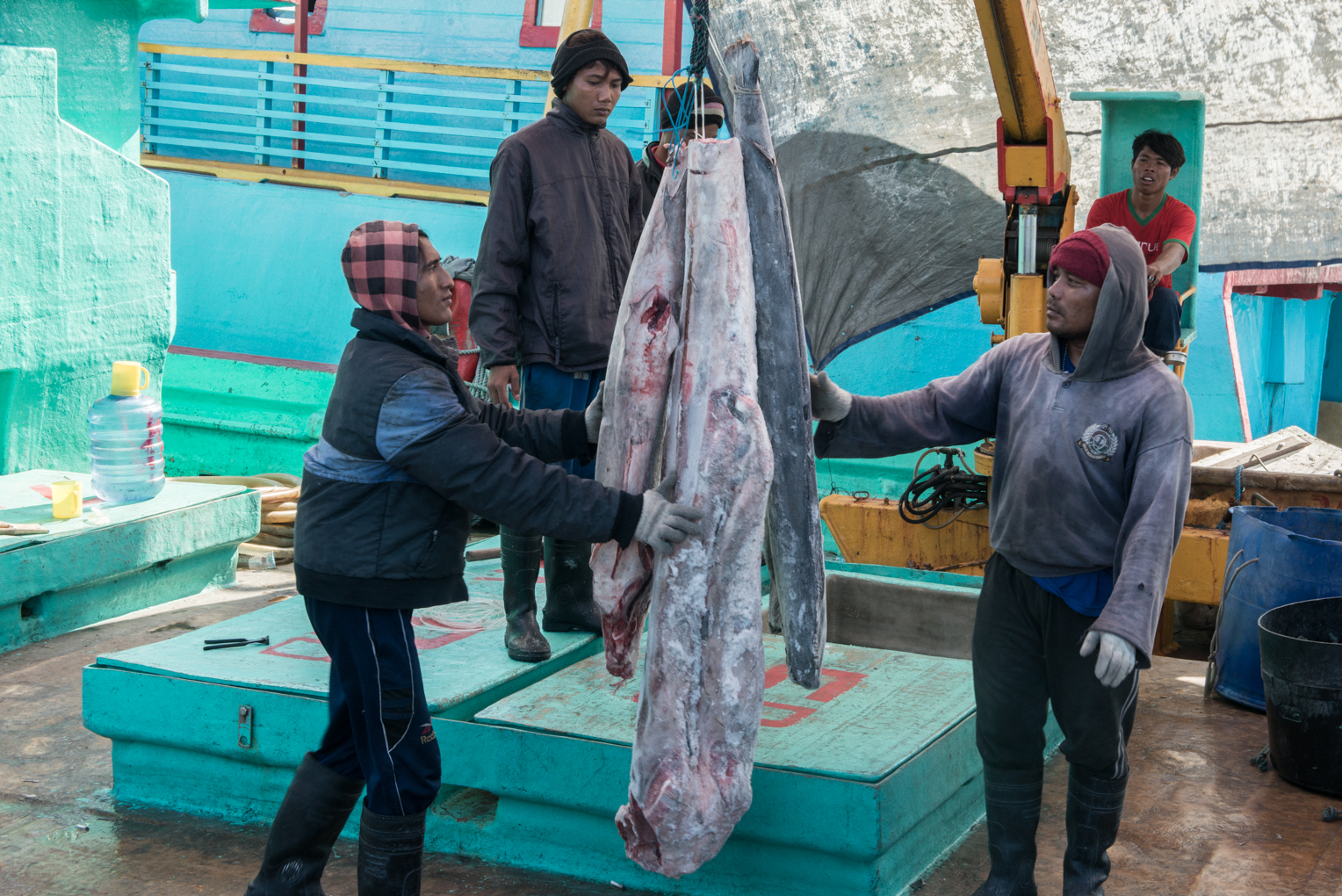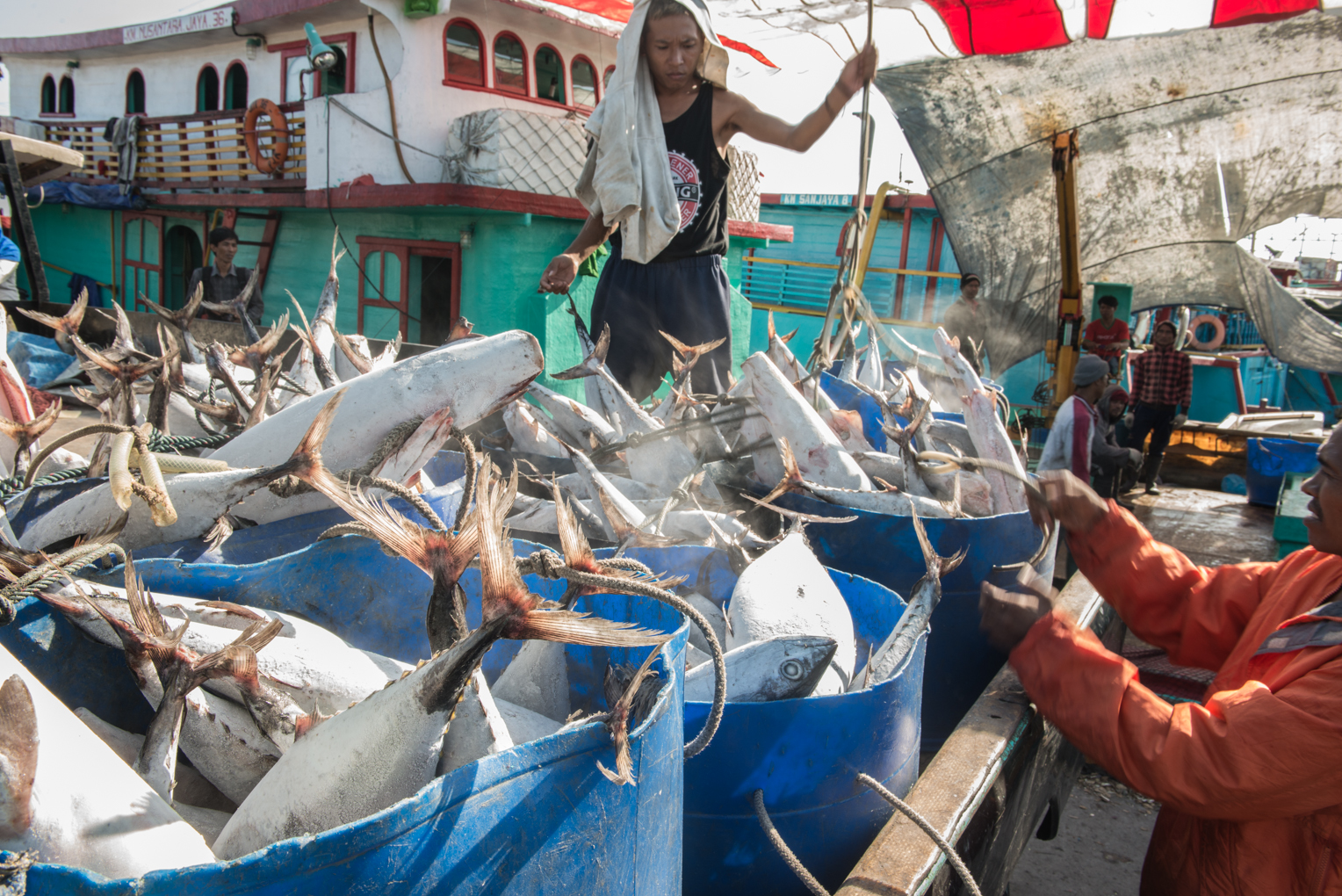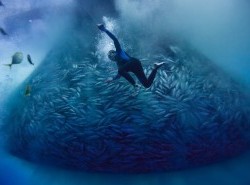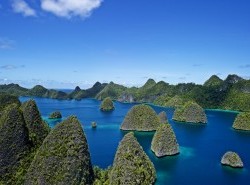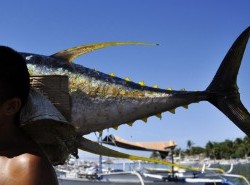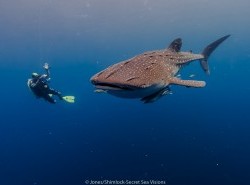The tuna fishermen use a crane to lift the clutch of frozen sharks onto a flat bed truck backed up on the edge of the wharf at Benoa harbour in Bali, Indonesia. The sharks’ heads and dorsal fins are missing, but the crane operator obligingly tells me what species they are – hammerhead, saw tooth and oceanic white tip.
More loads follow, including five canvas bags packed with fins destined for soup. Much of the shark meat will be processed for the domestic market – but the tuna is destined for consumers in Europe, America and Japan, few of whom realise they’re implicated in the killing of sharks on a massive scale.
Scores of boats like this dock here every week – there are more than 33,000 purse seiners operating in Indonesia, the world’s number one producer of tuna. The shark are technically bycatch, but they’d be more accurately described as valuable byproduct. And the sheer numbers being caught are shocking.
Even more alarming is the fact that all three of the shark species mentioned above are on the IUCN’s red list of endangered species. There are many other ‘hub’ ports in this sprawling archipelagic nation of 250m where sharks are offloaded in similar numbers both for export and domestic consumption.
Indonesia catches on average 109,000 tonnes of shark per year, giving it the dubious distinction of being the world’s biggest shark fishery. And it’s the country’s tuna industry that’s largely responsible for driving it.
“Many conservation efforts have focused on small-scale artisanal fisheries,” says Andrew Harvey, the Sustainable Fisheries team leader for USAid’s Indonesia Marine & Climate Support (IMACS) project. “But the industrial fishing fleets also have an important impact on shark populations. The big problem is a total lack of management regulations for most shark species — no catch quotas, no minimum sizes, and no fishing bans.”
There is evidence that a combination of campaigning and legislation is reducing demand for shark fins in Hong Kong and Mainland China. But shark flesh is an important source of protein for many coastal communities in Indonesia and the meat is sold everywhere including in supermarkets. There are also signs of an upsurge in the sale of baby sharks, which are routinely stocked by many of the big supermarket chains. Sharks have long reproductive cycles so targeting juveniles can have a destructive impact on wild populations.
Scores of boats like this dock here every week – there are more than 33,000 purse seiners operating in Indonesia, the world’s number one producer of tuna. The shark are technically bycatch, but they’d be more accurately described as valuable byproduct. And the sheer numbers being caught are shocking.
Even more alarming is the fact that all three of the shark species mentioned above are on the IUCN’s red list of endangered species. There are many other ‘hub’ ports in this sprawling archipelagic nation of 250m where sharks are offloaded in similar numbers both for export and domestic consumption.
Indonesia catches on average 109,000 tonnes of shark per year, giving it the dubious distinction of being the world’s biggest shark fishery. And it’s the country’s tuna industry that’s largely responsible for driving it.
“Many conservation efforts have focused on small-scale artisanal fisheries,” says Andrew Harvey, the Sustainable Fisheries team leader for USAid’s Indonesia Marine & Climate Support (IMACS) project. “But the industrial fishing fleets also have an important impact on shark populations. The big problem is a total lack of management regulations for most shark species — no catch quotas, no minimum sizes, and no fishing bans.”
There is evidence that a combination of campaigning and legislation is reducing demand for shark fins in Hong Kong and Mainland China. But shark flesh is an important source of protein for many coastal communities in Indonesia and the meat is sold everywhere including in supermarkets. There are also signs of an upsurge in the sale of baby sharks, which are routinely stocked by many of the big supermarket chains. Sharks have long reproductive cycles so targeting juveniles can have a destructive impact on wild populations.
According to Harvey, Indonesia signed the United Nations International Plan for Action for the Conservation and Management of Sharks in 1999, and has been developing a national plan of action ever since:
Despite the absence of a strong national plan of action, there is some evidence that governance is slowly moving in the right direction.
In 2013, IMACS helped Indonesia’s ministry of marine affairs and fisheries to launch a national onboard observer programme, with fishery officers deployed to fishing vessels to monitor compliance and record details of the bycatch. Over the past year 150 onboard observers have been recruited and trained, but there is still a long way to go.
The US initiative has also helped to develop a new approach to fisheries information known as I-Fish, which has now been handed over to the government of Indonesia. “I-Fish uses cutting edge technologies to streamline the transfer of fisheries information throughout Indonesia. It is also a way for the fishing industry and government to work together, to enhance fisheries data, transparency and management.”
Perhaps the biggest win for sharks came in 2010 when the district government of Raja Ampat in West Papua, the world’s epicentre of marine biodiversity and a popular dive destination, was declared a shark and manta sanctuary. This designation was the first of its kind in the entire coral triangle bioregion, which encompasses the waters of the Philippines, Indonesia, Malaysia, Papua New Guinea, Solomon Islands and Timor Leste.
West Manggarai, another district that is a rich repository of marine life and includes the Komodo national park world heritage site, took a similar step soon after. These locally-led conservation initiatives were unprecedented in Indonesia, and the national government responded by declaring the entire nation a manta sanctuary in early 2014.
But widespread, definitive action on sharks has yet to take place.
Currently, only whale shark, thresher and saw tooth are protected under Indonesian law (Cites protection only applies to the export of endangered species). Hammerheads and oceanic white tips should soon follow suit.
These are all first steps – gathering and assessing baseline data, establishing policies, protecting a few key ecosystems. But the big challenge is enforcement in a maritime nation made up of more than 17,000 islands where tens of millions of people rely on fishing for their livelihood.
In economic terms, there’s compelling evidence that sharks are worth more alive than dead. Not only do they play a critical role in maintaining the health of the marine ecosystems, they’re of huge value to the tourism industry. A 2011 study by the Australian Institute of Marine Science in Palau showed that a single reef shark was worth $1.9m over its lifetime to the tourism industry there.
It’s no coincidence that two of Indonesia’s top dive destinations are leading the way in shark protection. Bottom-up initiatives like these – driven by conservation minded dive operators, NGOs and local government – are making a difference in coastal areas and amongst small scale artisanal fishing communities. “But who is championing the fight further offshore, where large scale industrial fleets are landing scores of sharks every day?” asks Harvey.
Protection of these sharks, let alone a countrywide ban on shark fishing is a long way away. Until then, unless you’re buying pole & line caught tuna certified by the Marine Stewardship Council, those dead baby sharks may as well be sitting on your supermarket shelves.
“While some progress has been made, the current version of this plan is insufficient to sustain shark populations or the fisheries that harvest them. The plan urgently needs to be strengthened, with full protection proposed for the most vulnerable species, and minimum sizes, catch quotas or other harvest controls for other, more resilient species harvested by both artisanal and industrial fisheries.”
Despite the absence of a strong national plan of action, there is some evidence that governance is slowly moving in the right direction.
In 2013, IMACS helped Indonesia’s ministry of marine affairs and fisheries to launch a national onboard observer programme, with fishery officers deployed to fishing vessels to monitor compliance and record details of the bycatch. Over the past year 150 onboard observers have been recruited and trained, but there is still a long way to go.
The US initiative has also helped to develop a new approach to fisheries information known as I-Fish, which has now been handed over to the government of Indonesia. “I-Fish uses cutting edge technologies to streamline the transfer of fisheries information throughout Indonesia. It is also a way for the fishing industry and government to work together, to enhance fisheries data, transparency and management.”
Perhaps the biggest win for sharks came in 2010 when the district government of Raja Ampat in West Papua, the world’s epicentre of marine biodiversity and a popular dive destination, was declared a shark and manta sanctuary. This designation was the first of its kind in the entire coral triangle bioregion, which encompasses the waters of the Philippines, Indonesia, Malaysia, Papua New Guinea, Solomon Islands and Timor Leste.
West Manggarai, another district that is a rich repository of marine life and includes the Komodo national park world heritage site, took a similar step soon after. These locally-led conservation initiatives were unprecedented in Indonesia, and the national government responded by declaring the entire nation a manta sanctuary in early 2014.
But widespread, definitive action on sharks has yet to take place.
Currently, only whale shark, thresher and saw tooth are protected under Indonesian law (Cites protection only applies to the export of endangered species). Hammerheads and oceanic white tips should soon follow suit.
These are all first steps – gathering and assessing baseline data, establishing policies, protecting a few key ecosystems. But the big challenge is enforcement in a maritime nation made up of more than 17,000 islands where tens of millions of people rely on fishing for their livelihood.
In economic terms, there’s compelling evidence that sharks are worth more alive than dead. Not only do they play a critical role in maintaining the health of the marine ecosystems, they’re of huge value to the tourism industry. A 2011 study by the Australian Institute of Marine Science in Palau showed that a single reef shark was worth $1.9m over its lifetime to the tourism industry there.
It’s no coincidence that two of Indonesia’s top dive destinations are leading the way in shark protection. Bottom-up initiatives like these – driven by conservation minded dive operators, NGOs and local government – are making a difference in coastal areas and amongst small scale artisanal fishing communities. “But who is championing the fight further offshore, where large scale industrial fleets are landing scores of sharks every day?” asks Harvey.
Protection of these sharks, let alone a countrywide ban on shark fishing is a long way away. Until then, unless you’re buying pole & line caught tuna certified by the Marine Stewardship Council, those dead baby sharks may as well be sitting on your supermarket shelves.
